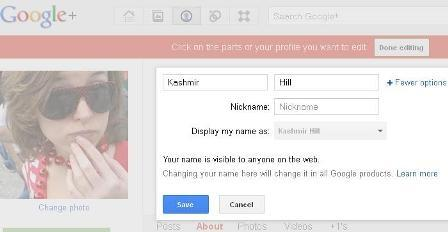The Google+ real names policy has sparked a lively debate in the social media landscape, serving as a potential watershed moment in how we perceive digital identity. Advocates for this policy argue that using real names fosters a more authentic user experience, minimizing the trolls and misinformation often associated with online anonymity. However, critics raise valid concerns about the necessity of protecting one’s privacy in certain situations, such as under oppressive regimes or when whistleblowing. The tension between real names versus pseudonyms highlights the importance of real names in building genuine online communities where users can interact openly and respectfully. As social media evolves, understanding the implications of identity—both real and assumed—remains paramount for users and platforms alike.
When discussing the Google+ real names policy, it’s essential to recognize the broader implications of social media identity and how it shapes user interactions online. This policy, which mandates the use of actual names, stands in stark contrast to the anonymity in online communities that many users often prefer. Safety concerns and the choice between authenticity and pseudonymity are at the heart of debates over what constitutes a healthy online environment. While some argue for the importance of real names to build trust and accountability, others highlight the fundamental need for privacy and protection in the digital space. Ultimately, the discussions surrounding Google+ serve as a microcosm for the ongoing dialogue about our identities in the online world.
Understanding Google+ Real Names Policy
The Google+ real names policy has become a topic of debate in online communities, as it emphasizes the use of authentic identities for social interactions. This approach aims to foster genuine connections among users, encouraging trust and accountability in discussions. By requiring real names, Google+ distinguishes itself from other platforms that permit pseudonyms, which can lead to rampant trolling and disrespectful behavior. The real names policy is founded on the principle that people are more civil and constructive when they engage under their true identities, just as they would in a physical space like a bar or café.
Despite the clear benefits of authenticity, it’s important to recognize that the real names policy has raised concerns for some users. Many individuals require anonymity for legitimate reasons, including whistleblowers, activists in oppressive regimes, or those simply wanting to maintain privacy regarding their gender identity. Critics argue that this policy might alienate those who seek safe spaces online. However, the prevailing thought is that while anonymity serves a small segment of the community, the majority crave a platform where they can interact with real individuals and build lasting relationships.
The Importance of Real Names in Social Media
Using real names on social media platforms builds a safer and more respectful environment. When people communicate under their true identities, there tends to be a heightened sense of accountability, which can deter negative behaviors such as trolling or harassment. The importance of real names extends beyond maintaining civility; it fosters a community where users are more likely to engage meaningfully and create connections based on trust. Just like in real life, sharing your name signifies that you stand behind your opinions and that you are open to discussions.
Moreover, the concept of social media identity is intricately linked to the real names policy. When users choose to interact on platforms like Google+, they are not merely exchanging ideas; they are also presenting a digital representation of themselves. This digital persona can influence how others perceive them, affecting the quality of interactions. Therefore, embracing real names is beneficial not just for creating a respectful community but also for enhancing the overall user experience, allowing for rich conversations that can lead to collaboration and growth.
Anonymity in Online Communities: A Double-Edged Sword
The allure of anonymity in online communities cannot be denied, as it provides individuals with a shield to express their thoughts without fear of judgment. This freedom can encourage open discussions on sensitive topics, allowing individuals to share experiences without personal repercussions. However, this very anonymity can sometimes lead to toxic behavior, with users feeling emboldened to lash out without accountability. Critics argue that platforms that allow pseudonyms often become breeding grounds for negativity, which stifles constructive discourse.
The key challenge for social networks like Google+ is to balance the needs of those seeking anonymity with the majority desiring transparency. While there are countless spaces that cater to anonymous interaction, Google+ stands out by emphasizing real names as a means to cultivate a more authentic and engaged environment. This distinction underscores the platform’s commitment to fostering a community where people can connect meaningfully, just as patrons do in a bar like Cheers.
The Pros and Cons of Pseudonyms in Social Media
The use of pseudonyms in social media presents a fascinating juxtaposition of benefits and drawbacks. On one hand, pseudonymous profiles can enhance user privacy and provide a safe space for individuals to converse without revealing their true identities. This can be particularly valuable in contexts where self-expression may lead to significant personal risk, such as political dissent or sensitive personal matters. Proponents of anonymity argue for its inclusion, stating that it empowers marginalized voices who might otherwise remain silent.
Conversely, the prevalence of pseudonyms can lead to a crisis of trust within communities. The anonymity that allows for free speech can also breed hostility and misinformation, undermining the quality of interactions. When users are shielded by aliases, accountability diminishes, making it easier for some to engage in destructive commentary without the repercussions they would face as their authentic selves. The challenge lies in finding a middle ground that protects individuals’ need for privacy while maintaining the integrity and quality of discourse.
Building Real Communities Through Authenticity
In social media, the vision of building real communities relies heavily on authenticity. When users engage under their real names, it invites candor and fosters relationships built on trust and familiarity. Platforms striving for a community-driven atmosphere must prioritize the encouragement of real identities to cultivate genuine interactions. Just as ‘Cheers’ served as a familiar gathering place, Google+ aims to be a digital equivalent where users feel connected to one another, creating a welcoming and constructive environment for dialogue.
Creating spaces where ‘everybody knows your name’ can significantly enhance user engagement and loyalty. When people identify with one another beyond mere usernames, they are more likely to participate actively in discussions, share personal stories, and support each other. Therefore, the importance of real names is not just a policy but a cornerstone of effective community building in the ever-evolving landscape of social media.
Google+ User Experience: The Impact of Identity
The Google+ user experience reflects the strong impact of identity in social media interactions. By integrating a real names policy, Google+ aims to create a platform where users can expect authentic engagement rather than encountering faceless comments from pseudonymous users. This makes every interaction more meaningful, as participants are recognized for who they truly are. In an age of digital noise, where anonymity is rampant, platforms that emphasize real names stand out by providing a clearer, more focused user experience.
Furthermore, the Google+ real names approach enables users to leverage their social media presence positively. With real identities, individuals can build their personal brands, connect with others in their field, and engage in professional networking opportunities. This emphasis on authenticity enhances trust among users, encouraging them to share insights and collaborate effectively. Ultimately, the user experience is significantly enriched by promoting realness, setting Google+ apart in a crowded marketplace.
The Debate: Real Names vs. Anonymity
The ongoing discourse surrounding real names versus anonymity highlights the complexities of online identities. Advocates for real names argue that fostering transparency leads to healthier interactions and more sincere relationships within the community. They see the potential for authentic exchanges as key to creating a vibrant social space where users feel free to engage openly, much like in real-world interactions. This connection mirrors the essence of social spaces such as ‘Cheers’—places where camaraderie flourishes through genuine engagement.
On the flip side, supporters of anonymity present a compelling case for preserving the right to privacy and protection in digital spaces. They advocate for allowing individuals to express themselves without the fear of backlash that often accompanies public identity. This tension between the need for safety and the desire for community authenticity remains at the heart of the debate. As social networks continue to evolve, striking a balance between these opposing views is crucial to ensure that they remain spaces where diverse voices can be heard.
Responses to Google+ Policy: Community Sentiment
Community sentiment surrounding the Google+ real names policy reveals a wide spectrum of reactions. Some users express strong support for the initiative, believing it nurtures accountability and civil discourse, while others feel that it compromises privacy and excludes essential voices. These varied opinions underscore the diverse experiences of social media users, each with unique concerns and needs. Many find solace in the promise of a platform that encourages engagement through authentic representation, reminiscent of personal interactions in familiar social venues.
Conversely, dissenting views caution against potential pitfalls of a real names mandate. Critics raise concerns about the risk of marginalizing users who rely on anonymity for protection. These discussions are vital as they inform how social networks can adapt to accommodate a broader range of experiences while still attempting to create a more harmonious online community. Engaging in open conversations about these policies can help platforms like Google+ find pathways to balance authenticity with inclusivity.
The Future of Social Media: Embracing Real Identities
The future of social media is poised at an intersection of authenticity and privacy, where platforms must carefully navigate the challenges presented by the real names policy. As users become increasingly aware of the implications of online identity, those that embrace real names will likely thrive in cultivating engaged and trusting communities. There is a collective yearning for social networks that prioritize real interactions over anonymous trolling, as evidenced by the positive sentiment among many Google+ users. They envision a digital space rooted in respect, civility, and connection.
Looking ahead, it is essential for platforms to adapt their policies to meet evolving user demands. As privacy concerns grow, the challenge will be finding innovative solutions that embrace honest identity while safeguarding personal information. The potential for community-driven platforms that value authenticity cannot be overstated, as they hold the promise of reshaping how we connect and communicate in the digital age. Ultimately, a balance between real identities and user safety will determine the success of future social media networks.
Frequently Asked Questions
What is the Google+ real names policy and why is it important for social media identity?
The Google+ real names policy requires users to sign up using their actual names, which aims to enhance transparency and accountability in social interactions. This policy is important as it fosters a more authentic social media identity, allowing users to engage with verified individuals rather than anonymous accounts. By promoting real names, Google+ seeks to create a more respectful and constructive online environment.
How does the Google+ real names policy impact anonymity in online communities?
The Google+ real names policy limits anonymity in online communities, requiring individuals to identify themselves with their real names. This approach is designed to reduce harassment and trolling, as users are less likely to engage in harmful behavior when their true identities are known. While it may sacrifice some levels of privacy, the policy aims to build safer communities where users can freely express themselves without fear of being targeted anonymously.
What are the arguments for and against the Google+ real names policy regarding real names versus pseudonyms?
Proponents of the Google+ real names policy argue that using real names promotes accountability and civil discourse, making online communities more constructive. Conversely, critics argue that anonymity is necessary for protecting vulnerable individuals in oppressive regimes or those expressing marginalized identities. The debate hinges on balancing the need for community safety and the freedom for users to choose their online identities.
Why does Google emphasize the importance of real names in the context of Google+ user experience?
Google emphasizes the importance of real names in enhancing the Google+ user experience by fostering genuine interactions and building trust among users. Real names help in establishing a sense of community, which can lead to more meaningful connections and discussions. By requiring real names, Google+ aims to create an environment where users can engage more openly and respectfully, similar to the concept of a friendly neighborhood bar where ‘everybody knows your name.’
What concerns do users have regarding Google+ real names policy affecting their online safety?
Many users express concerns that the Google+ real names policy might compromise their online safety, particularly for those in sensitive situations where disclosure of their real identity could lead to harassment or persecution. Critics of the policy argue that it does not adequately address the needs of individuals who require anonymity for protection, such as whistleblowers or those living under oppressive regimes.
How has the Google+ real names policy influenced the nature of discussions within the platform?
The Google+ real names policy has positively influenced discussions on the platform by encouraging civil and constructive exchanges. When users interact under their real identities, they are often more respectful and considerate in their communications. This leads to higher quality discussions and a community atmosphere where users feel more connected and valued, thus enhancing the overall user experience.
What is the relationship between Google+ real names policy and the presence of trolls in online discussions?
The Google+ real names policy aims to reduce the presence of trolls in online discussions by linking user comments to real identities. Since anonymity often enables toxic behavior, using real names is believed to discourage users from engaging in such negative actions, thereby promoting healthier discussions and a more welcoming community atmosphere on the platform.
| Key Point | Details |
|---|---|
| Introduction to Google+ Real Names Policy | Google+ emphasizes the use of real names to foster authentic online interactions and discourage trolling. |
| Controversy Surrounding the Policy | Many users argue that anonymity is crucial for safety and self-expression, particularly in oppressive environments. |
| Support for Real Names | Proponents believe that real names lead to civil discussions and stronger communities, reducing trolling and negative behaviors. |
| Google’s Stance | Eric Schmidt stated that Google+ will continue to require real names to function as an identity service. |
| User Reactions | Feedback is mixed, with some users agreeing with the real names policy while others seek anonymity for privacy. |
| Conclusion | The debate on real names versus anonymity in social networks continues, highlighting the balance between safety and community engagement. |
Summary
The Google+ real names policy has been a topic of significant debate among users and advocates of online privacy. This policy is aimed at creating an environment where all members are identifiable, fostering genuine interactions and minimizing abusive behavior on the platform. While some emphasize the necessity of anonymity for safety and personal expression, the consensus among proponents of the real names approach is that it cultivates a healthier online community. Thus, understanding the Google+ real names policy becomes crucial for navigating social media responsibly.



